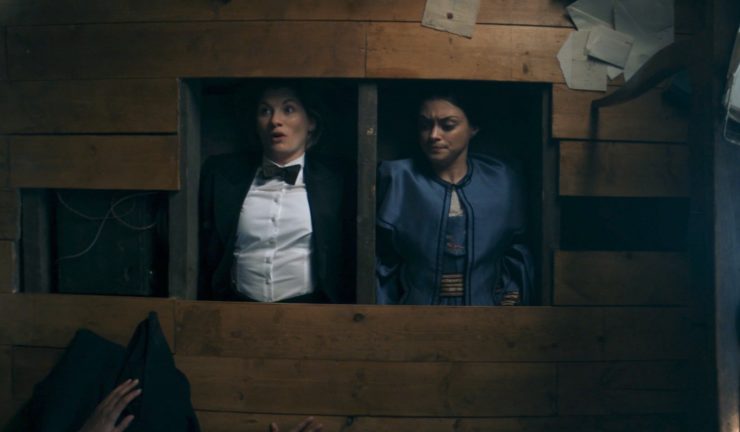The Doctor is about to team up with a few good women to stop her favorite megalomaniac. Can’t be too hard, right? Just an ordinary Sunday.
Summary
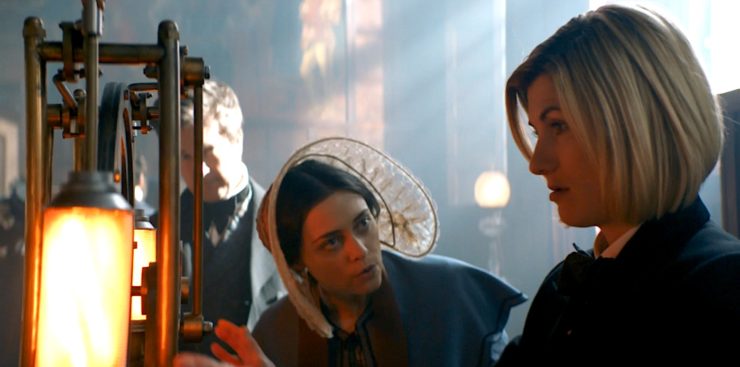
The Doctor meets a woman (Sylvia Briggs) in the conduit forest who believes that the alien figures (who are called the Kasaavin) are guardians of some sort. They zap her back to her place in time and the Doctor hitches a ride. She learns that the woman is Ada Lovelace, and the Master somehow tracks them down. Ryan, Yaz, and Graham stay alive when Ryan discovers clues left for him by the Doctor on how to safely land the plane in the present. They wind up back in England, where Barton has arrived via the Master’s TARDIS. They intend to keep an eye on him, but he tracks them through CCTV and their phones, and puts their pictures out for the public to see, so they have to go off the grid. Back in the 19th century, the Doctor finds a sculpture called The Silver Lady in Charles Babbage’s (Mark Dexter) place, and realizes that it’s linked to the Kasaavin. She hopes to summon one by activating the sculpture, and hitch a ride to the 21st Century. But Ada hitches a ride with her, and they end up in 1942, Paris. There they meet Noor Inayat Khan (Aurora Marion), and find that the Master has tracked them again, this time in the guise of a Nazi.
In 2020, Yaz, Ryan, and Graham keep barely escaping the Kasaavin. They’re on the run, with Yaz unable to tell her family what’s happened to her. The group realize that there’s very little they know about the Doctor, and they can’t figure out why any of this is happening. Ryan and Graham took some spy tech from the kits that C gave them, and Graham figures out the laser shoes, which comes in handy as they work to track down Barton. They end up in a warehouse where Barton’s mother is being held—Barton has killed her.
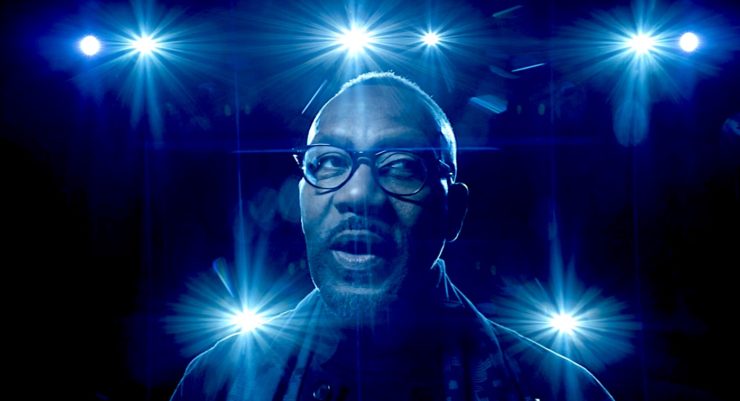
The Doctor contacts the Master through the drumbeat rhythm that’s followed him his whole life. They set up a mental connection and agree to meet at the Eiffel Tower. There, the Master reveals his plans to get rid of the human race using Barton and the Kasaavin, and then take power for himself. He also tells the Doctor that Gallifrey has been destroyed. The Doctor gets the Master arrested by the Nazis as a British double agent, and uses his TARDIS to get back to the 21st century right as Barton and the Kasaavin are trying to overwrite all of humanity with alien DNA. The Master has also arrived for the party (having lived through the last 77 years the long way), but the Doctor reprogrammed The Silver Lady so that the plan cannot go through, turning the Master over to the Kasaavins after revealing his duplicity. The Master is sent to their dimension (the conduit forest) while the Doctor goes back to rig the airplane landing video for the TARDIS crew. She sends Ada and Noor back to their times, wiping their memories of her existence.
The Doctor does go to Gallifrey and finds the Master was telling the truth—their planet has been destroyed. She gets a message from him, telling her that he is responsible for the carnage; he wanted to make the Time Lords pay for a terrible lie that he’s uncovered about “The Timeless Child”. Later, Ryan, Yaz, and Graham ask the Doctor who she really is. She admits to being a Time Lord, to stealing her TARDIS, and to how she knows the Master, but refuses to take them to Gallifrey when Yaz asks.
Commentary
I have a lot of questions, but most of them center around one particular query: Is that the last we’re going to see of the people and plots from this two-parter?
If these characters and the danger raised in these episodes become part of the season arc, or the finale, then this was a great set up. If we never see these people again… that’s a problem. Because there are so many lose ends here, and some of them are downright awful.
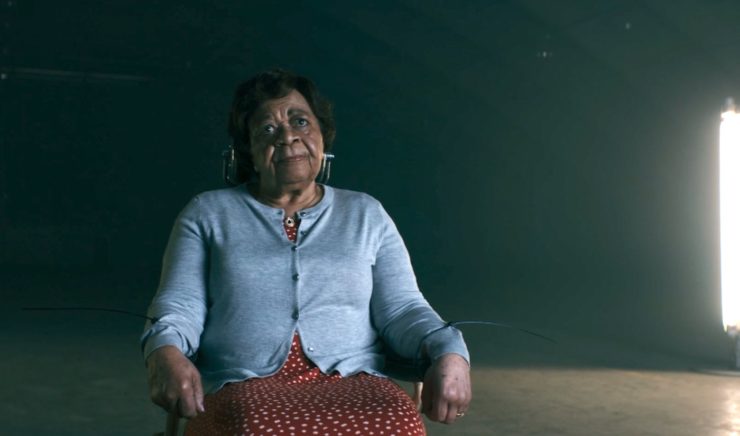
For example, why were we introduced to Daniel Barton’s mother (played by Blanche Williams, who is deadpan perfection from the first frame) only to watch her get murdered a minute later? If it’s just to make it clear that Barton is a terrible person, then there were other ways of doing that—ways that didn’t involve killing another black woman on Doctor Who after Grace’s death last season. Barton’s story here also doesn’t seem remotely finished, given that he publicly claimed he was going to wipe out humanity, and then didn’t succeed. The story of the Kasaavin doesn’t seem finished either (I’m still not convinced that they’re not the new version of the Cybermen?)… and if you expect me to believe that the Master is just going to hang out in their weird nether dimension forever, that’s a timeshare that no one in the fandom will buy.
Parts of this episode come off a little underdone, which probably has more to do with wanting that reveal at the end of Part One. If the Master’s presence had come forward earlier, there might have been time to weave the plot threads tighter and sooner, but as is, there’s a lot of confusion around who is doing what and why. The Kasaavin are watching people through history who were involved with the invention of the computer? Barton agreed to help them… because technology or maybe threats? The spy aspect of the story now only applies to Graham and Ryan because they were the only people who cared enough to keep some spy stuff? (I do love that they use some of it, but it seems like an afterthought.) How can the current TARDIS crew continue their lives when they were all over the news, and why aren’t we learning about the repercussions of that sooner? Those are big things to just leave hanging, even if they were planning to keep traveling with the Doctor before dealing with any of it.
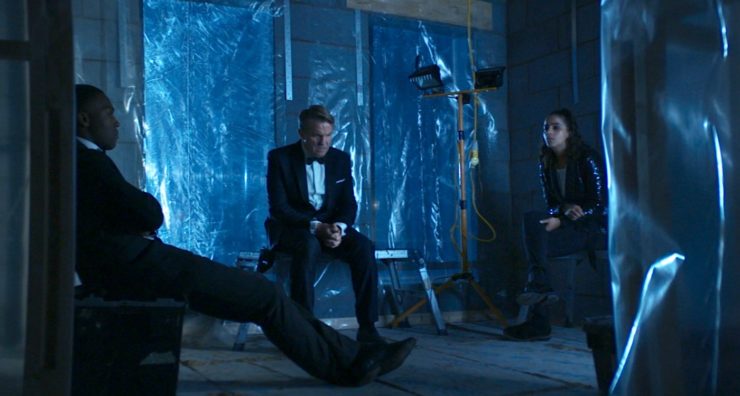
The one thing that does remain consistent is the Master’s motivation because it’s been consistent through over a half century of television: When the Doctor asks point blank when all his murder and mayhem will cease, the Master asks why he would stop… when this is the only thing that guarantees the Doctor’s attention.
He goes to great lengths for it in this episode, even to the point of joining up with the Nazis during WWII to seek her out. From a metatextual standpoint, seeing a person of color in a Nazi uniform is patently awful, and I’m not sure it’s justifiable regardless of the character making that choice. (Note: I am a white person, so my opinion on this is less relevant than how people of color find it.) On the other hand, from an in-universe perspective, I appreciate the realism that is levied in its use. The Master is currently a person of color, ergo he would never be accepted as a Nazi—something that both he and the Doctor are cognizant of, to the point where the Master uses a perception filter in order to make himself appear more acceptable to their ranks. The Doctor is so mortified by this that she breaks said filter and calls him in as a British spy, forcibly revoking his choice to join them. I find this interesting due to the running parallels between their characters. While it doesn’t happen too often, being a woman has occasionally put the Doctor at a disadvantage, tugging at the veil of privilege that she’s normally situated behind. In this case, we get to see the Master encounter a similar change of privilege from another perspective.
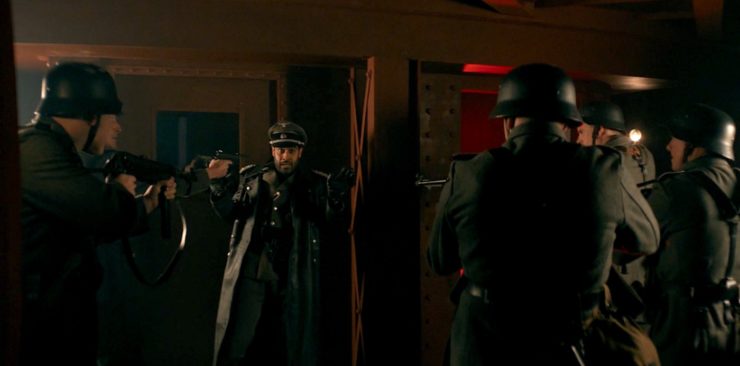
I’m impressed with their interactions overall, and how the director and actors played the Doctor and Master’s relationship without falling prey to lazy sexist tropes now that their gender dynamic has been reversed. The Master still has that obsession around the Doctor saying his name, but we’ve seen it before, back when they were both men. All the moments that could feel needlessly sexualized—the kneeling, the chokehold—never come off that way because Whittaker never plays it as though she’s lost the upper hand. Their power plays have changed to suit their current iterations, as they are meant to do every time the parts change hands.
What’s behind all of this timeline tracking and the potential end of humanity is something far closer to home, though. The Doctor and the Master’s home, that is. This turns out to be part of a larger issue that will no doubt power the season—the reveal that the Master has destroyed Gallifrey (funny, given that up until the 50th anniversary, the Doctor had also done that) in recompense for learning something terrible about the Time Lords. This something has to do with the “Timeless Child”, which we heard about last season in “The Ghost Monument”, said to be “outcast, abandoned, and unknown.” There were a lot of theories on who this child was at the time, ranging from the Doctor herself to her granddaughter Susan from the show’s very first seasons. But the Master talks about the Timeless Child as though they are part of Gallifreyan lore or history, suggesting a different source for his fury.
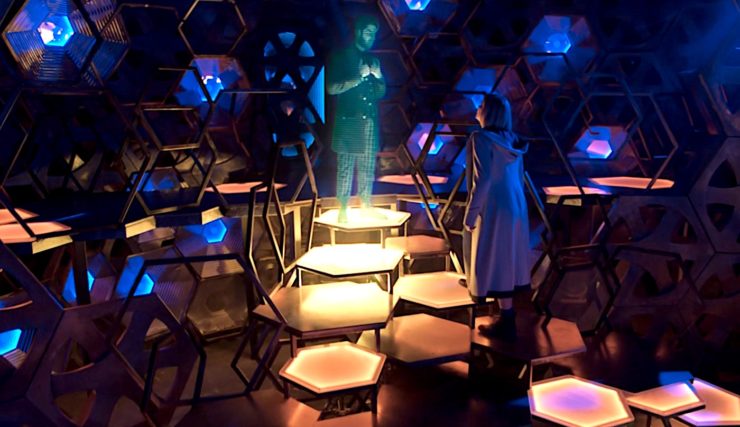
Keep in mind, whatever this is likely to be beyond your average level of terrible; the Master found out that the Time Lords were responsible for the cranial drumbeat that plagued his entire existence during “The End of Time”, and likely only killed Rassilon over it. If he’s moved on to species genocide, that means that it’s somehow worse then finding out that your own people callously and purposefully drove you to madness.
Buy the Book
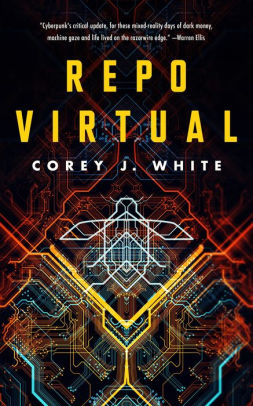

Repo Virtual
Being upfront, I’m completely in favor of this arc. Despite how nice it might be to see the Doctor rescue Gallifrey from the Time War in a very special 50th anniversary celebration of the show, it never sat well with me that all was forgiven because the truth of the matter is—the Time Lords are horrible. We see that throughout the history of the show. And while I’m guessing that the Doctor will find some way to reverse what the Master has done before long, refusing to make Gallifrey into some sort of saintly bastion of fond memories and comfort for the Doctor just makes more sense.
She ran away from home for a reason.
Having an episode revolve around the Doctor meeting two incredible women of the past and forming a brief superteam with them is beautiful. Ada Lovelace and Noor Inayat Khan are such a delight to meet, and wonderful companions for the Doctor to adventure with… but there’s something off about the Doctor using Time Lord powers to erase their memories, something that fans cried foul over with Donna Noble over a decade ago for good reason. Not obtaining permission to do what she does isn’t suddenly okay because the Doctor is a woman now. It’s an awful thing to do—and far worse if you know that Noor Khan dies two years later in a Nazi concentration camp. At the very least, more attempts could have been made to explain why the action was necessary, to convince them both rather than ignoring their autonomy.
We end with concern from the current Team TARDIS over the Doctor’s lack of forthcoming around her person and past. We’ve seen this before, but usually in one-on-one situations that are easier for the Doctor to bypass. This time, it’s unlikely that the current crew will let her get away with it for long…
Things and asides:
- The Master’s outfit in the message that he leaves for the Doctor features plaid trousers that look an awful lot like something the Second Doctor would wear. It wouldn’t be the first time he’s borrowed style from his old school pal.
- We’ve known that Time Lords have the ability to get into each other’s heads since “The End of Time”, when the Master uses this connection to give the Doctor a glimpse of the drumbeat in his head. Said beat is what the Doctor uses to get his attention via Morse Code.
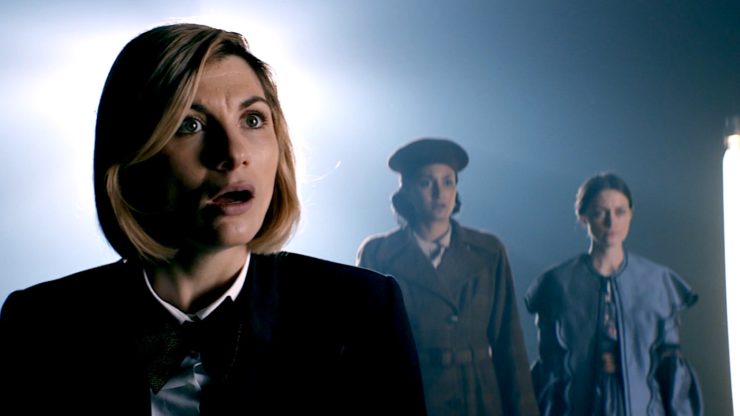
- Ada Lovelace reminding the Doctor that you never learn anything without trying it may be one of my favorite moments in all of Doctor Who ever.
- The Master telling the Doctor to kneel feels intentionally reminiscent of Loki in The Avengers. Maybe the Master watched the movie while he was hanging out in Australia and wanted to go one better? It makes sense that he’d see the parallels and go for it, being the drama boy he is.
- The Master’s Nazi uniform features a skull on his hat—used on SS uniforms.
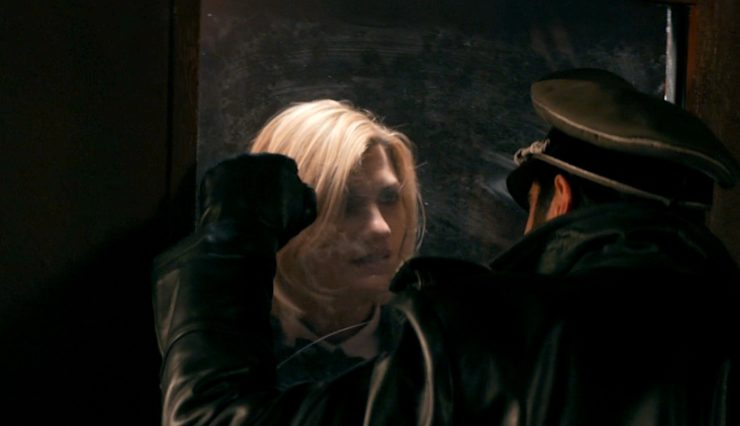
- Where did the Master’s TARDIS end up? The Doctor had it, then never indicates what she’s going to do with it. Granted, if the chameleon circuit is still functioning, she could outwardly turn it into any number of things… maybe she’s stored his TARDIS on her own TARDIS? Just leaving it somewhere seems like a bad move.
- There’s still no answer as to when this particular Master comes from. It would be pretty great if Missy somehow regenerated in spite of what her final appearance suggested, and would make sense, since he seems to know about the Time War and the pocket where Gallifrey is being kept.

- I love that Graham asks if they’re being replaced when he sees Ada and Noor. So sweet.
- The Doctor still has the occasional hiccup remembering her gender, as she does when trying to explaining her sudden appearance in Ada’s time. It’s perfect.
Emmet Asher-Perrin wants to know what Gallifrey managed to do this time. You can bug them on Twitter, and read more of their work here and elsewhere.










